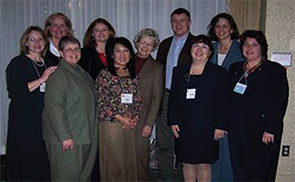“Volunteering provides excellent learning, professional and personal opportunities,” says Benjamin J. Smith, PA-C, DFAAPA (ARHP president, 2011–2012). These learned and developed skills are useful and applicable to the settings in which we find ourselves on a daily basis.”
For some presidents, leadership lessons were learned during turbulent times. Kathleen M. Ferrell, PT, MLA (ARHP president, 1985–1986), entered her presidency just as the ACR left the Arthritis Foundation and the ARHP decided to stay on. “This was a challenging period,” she says. “It was also a time when things needed to change, and we needed that change to be positive. As a result, I held the presidency for two years. I had really strong officers, and I felt we were able to come together as a group and guide the organization. In that time, we developed our first long-range plan, kick-started the effort to have our own journal and accomplished many other things that shaped us into more than a group of professionals that ‘just met.’”

ARHP members lobbying on Capitol Hill.
For others, like Linda Ehrlich-Jones, PhD, RN (ARHP president, 2009–2010), it’s the natural progression into leadership that stands out. “My volunteerism in the ARHP provided me with opportunities to hone my leadership skills,” she recalls, “first on a committee, then as a part of a team, then as a committee chair and finally as part of the leadership. That really helped me both within the ARHP and in my career as a whole.”
Although volunteering has opened many doors and sharpened many skills for these past presidents, current ARHP President, Kamala M. Nola, PharmD, MS, brings the volunteer experience back to collaboration, noting, “It has helped me better understand the perspectives of the healthcare team—the different roles we play and how we each bring strength to the team.”
A Welcoming Mentorship Mentality
Before one is inclined to volunteer, they must first receive a warm welcome, and the ARHP’s inclusive culture and spirited outreach and mentorship does just that.
“In many professional associations, although it is very collaborative, it can be very competitive,” says Dr. Richardson. “I have never sensed that with the ARHP. The organization never did go down that path, and I credit the leadership and the staff for ensuring partnerships and an inclusive culture.”
Perhaps one of the best examples of this member-centric approach to education is the creation of online educational tools at a time when … budgets for education & travel were shrinking, & members were growing more accustomed to self-paced & self-guided learning.
For Dr. Ehrlich-Jones, the opportunity to be nurtured through the organization and then provide the same outreach to others has been refreshing. “I quickly realized that people will take you under their wing and mentor you,” she says. “I now find myself mentoring people and trying to get them involved. I know involvement as a volunteer is a good experience, and it is very exciting to me to be on the other end offering mentorship to those interested in volunteering.”


